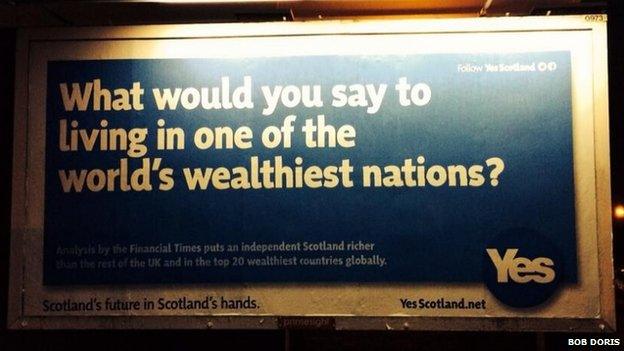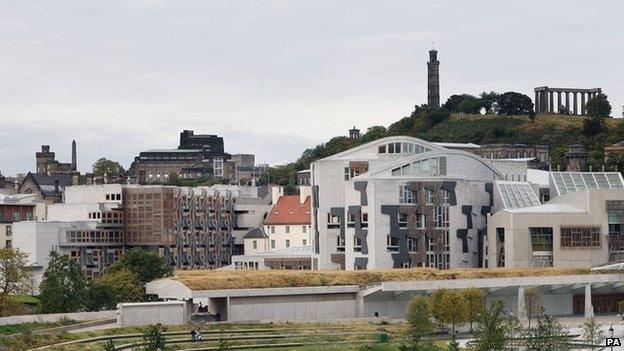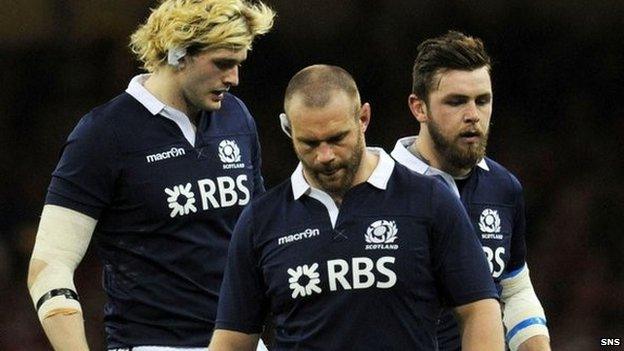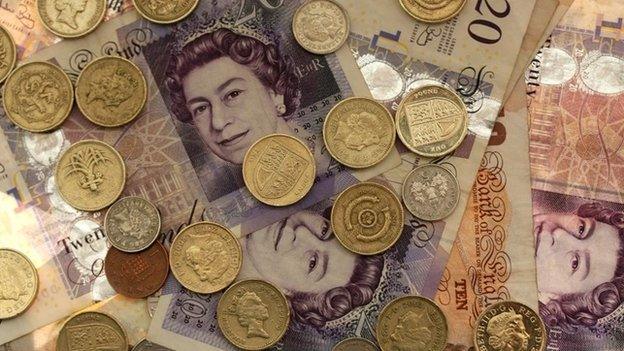Scottish independence: Is Scotland the 14th richest nation in the world?
- Published

"What would you say to living in one of the world's wealthiest nations?"
That's the question on the latest billboards from Yes Scotland - the campaign trying to persuade people to vote for independence on 18 September.
The claim that an independent Scotland would be one of the world's richest countries is based on a league table, external which places Scotland 14th in the world in terms of GDP per person, ahead of France, China, and the UK.
But what is "GDP per person", why does Scotland rate higher than some of the world's biggest economies, and what does this tell us about how rich an independent Scotland might be?

So, what is GDP?

As one of Scotland's biggest exports, whisky boosts Scotland's Gross Domestic Product
Simply put, it's the amount of money that is produced by a country. A value for what's being done each day by everyone going to work.
It's the sum of all the things that a country makes - whether it's whisky, concrete, software or beef - which is added together with how much the service industry is worth, how much we pay our nurses and teachers, and how much our bankers are producing.
It is measured every three months and can go up or down depending on how busy the High Street is, how much is being exported, the strength of a currency, and global conditions.
If it goes up, the economy is growing, and if it goes down, the economy is shrinking.

Why is GDP measured per person?

A smaller population has fewer people to share its GDP with, meaning each person gets more
A list that just compares total GDP would usually have the biggest countries at the top. According to the UN, that would put the US at the top followed by China, with the UK coming in at six.
This measures the size of the economy, but not how rich that country is, because if a country has a big economy, but lots of people to share the wealth between, then each person is poorer on average.
GDP per person shows the wealth of a nation. A small country with not very many people in it may be much more productive, or have lots of ways to create wealth, and so rank much higher up the list of GDP per capita.
It's this list of GDP per person that the Scottish government is quoting as part of the referendum debate, as Scotland, with its relatively small population, would rank 14th in the world according to a table produced by the OECD - the Organisation for Economic Co-Operation and Development.

Should I believe the OECD?

The OECD is seen as a highly trustworthy voice in the economic world
Yes.
The OECD is one of the organisations that was set up after World War 2 to try to help the world rebuild from the post-war economic rubble.
It does research and makes recommendations to help countries across the globe to grow economically.
It is seen as a neutral organisation and its research and statistics tend to be taken as the gold standard.

Why is Scotland included in the table?

The Scottish government put ONS statistics into the table
Scotland is not an independent country so is not measured by the OECD statistics.
However, the Scottish government has used statistics from the UK Office for National Statistics, to make an equivalent figure for Scottish GDP per capita.
This figure was then inserted into the list to compare with other countries.
This means people can see the comparative wealth of Scotland if it was as an independent country.

How does Scotland rank in other economic league tables?

As the 2014 Six Nations proved, Scotland doesn't rank highly in all kinds of table
The latest figures we have for Scotland's GDP are for 2012, and including a share of UK offshore oil the figure is £145bn.
This would put Scotland at about 57 in the UN's list of national GDP - between Iraq and Bangladesh. Of course these countries have much bigger populations than Scotland, which is why they rank lower on the GDP per person list.
Scotland's small population means its overall GDP is shared out among fewer people, giving each person a larger share as a result.
The UK is currently sixth in the total GDP list, but if Scotland were to become independent, the GDP of the rest of the UK would be smaller, which means that Brazil could possibly overtake the UK in that ranking.

So, would an independent Scotland be rich or not?

Scotland's currency could have a big effect on GDP after independence
Scotland is a comparatively rich country when you consider that the population is relatively small, but the figures being used are looking at the position of Scotland as it currently stands within the set-up of the UK.
Much would depend on the negotiations after the referendum, and the investment decisions of big companies.
The size of any country's GDP is hugely affected by the currency too, so if whether or not Scotland were to stay in a Sterling currency union, could have a big effect.
The GDP per person figures also do not show how wealth is spread out within a country. Scotland may well be comparatively rich as an independent country, but whether or not large parts of the population would "feel rich" would depend on the policies of a post-independence Scottish government.

What does this league table look like?
The Scottish government says the country can be ranked at 14th when its geographical share of North Sea output is included in Scottish GDP figures, external. The estimates in this table were produced using data available up to 7 March this year.
Production by Jamie Ross, BBC Scotland news.